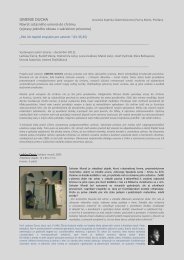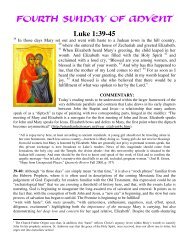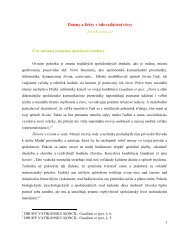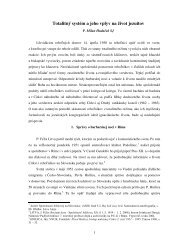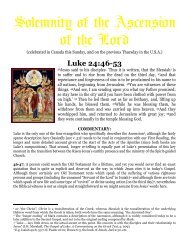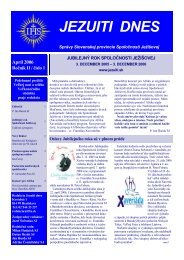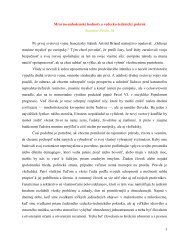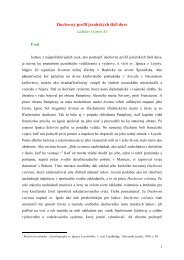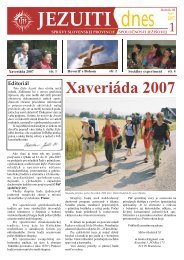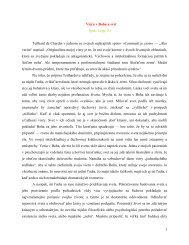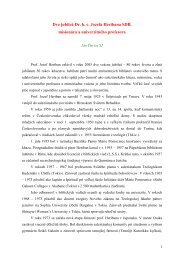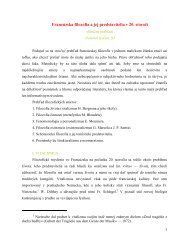Luke 16:19-31 - Jezuiti
Luke 16:19-31 - Jezuiti
Luke 16:19-31 - Jezuiti
Create successful ePaper yourself
Turn your PDF publications into a flip-book with our unique Google optimized e-Paper software.
<strong>Luke</strong> <strong>16</strong>:<strong>19</strong>-<strong>31</strong><br />
[Jesus spoke this parable to the Pharisees:] <strong>19</strong>‘There was a rich man who was dressed in purple<br />
and fine linen and who feasted sumptuously every day. 20And at his gate lay a poor man named<br />
Lazarus, covered with sores, 21who longed to satisfy his hunger<br />
with what fell from the rich man’s table; even the dogs would come<br />
and lick his sores. 22The poor man died and was carried away by<br />
the angels to be with Abraham. The rich man also died and was<br />
buried. 23In Hades, where he was being tormented, he looked up<br />
and saw Abraham far away with Lazarus by his side. 24He called<br />
out, “Father Abraham, have mercy on me, and send Lazarus to dip<br />
the tip of his finger in water and cool my tongue; for I am in agony<br />
in these flames.” 25But Abraham said, “Child, remember that<br />
during your lifetime you received your good things, and Lazarus in like manner evil things; but<br />
now he is comforted here, and you are in agony. 26Besides all this, between you and us a great<br />
chasm has been fixed, so that those who might want to pass from here to you cannot do so,<br />
and no one can cross from there to us.” 27He said, “Then, father, I beg you to send him to my<br />
father’s house— 28for I have five brothers—that he may warn them, so that they will not also<br />
come into this place of torment.” 29Abraham replied, “They have Moses and the prophets; they<br />
should listen to them.” 30He said, “No, father Abraham; but if someone goes to them from the<br />
dead, they will repent.” <strong>31</strong>He said to him, “If they do not listen to Moses and the prophets,<br />
neither will they be convinced even if someone rises from the dead.” ’<br />
COMMENTARY:<br />
<strong>19</strong>: “There was a rich man…”: down through Christian history, there has been a constant instinct to confer<br />
names on New Testament figures who are otherwise unnamed in the text. From a very early point<br />
onward, this individual was given the name of “Dives” (pronounced dee-vez), which is simply Latin for<br />
“rich man”. It is, of course, ironic (and typical of <strong>Luke</strong>’s reversal of expectations) that generations of<br />
Christians have known the name of Lazarus, the poor man, but that we never come to learn the name of<br />
the rich man, who should normally have been the one to attract our attention and interest, given the social<br />
structures of that time 1 .<br />
“dressed in purple and fine linen”: in the ancient world (before modern artificial dyes), purple dye was a<br />
rare and expensive commodity, produced from a type of shellfish or mollusc called the murex, and,<br />
because of its cost, was largely reserved to royalty and the upper nobility. To wear purple clothing was a<br />
very obvious sign of wealth and status around the ancient Mediterranean:<br />
1 This story also became a source of inspiration for many Christian artists down through the centuries, and was a<br />
particularly popular subject of carvings in the entrance way of some of Europe’s greatest churches:<br />
“The very position which the subject occupies in certain mediæval buildings proves that the Church had no other<br />
intention in representing the parable than to give the faithful a lesson in charity. It is seen in the porches at Moissac<br />
and La Grolière (Corrèze) and on the capitals of the south transept door of St. Sernin at Toulouse. That is to say, it is<br />
above the very spot where the poor were accustomed to sit and beg for alms. The beggars with outstretched hands at<br />
the door of the church were transfigured in the eyes of the faithful, for carved above their heads they saw the old-time<br />
triumph of Lazarus.” (Émile Mâle, Religious Art in France in the Thirteenth Century, p. 200)
The Iliad makes numerous references to garments of purple worn by kings and generals. In the<br />
Odyssey, the hero, Odysseus, is given a cloak dyed sea purple by his wife Penelope. Purple robes<br />
were deemed worthy offerings to Apollo at Delphi by King Croesus of Lydia, according to<br />
Herodotus. The poetry of Sappho relates the high esteem of purple garments as gifts for gods and<br />
goddesses. Greek lyric poets of the 5 th century BC equated purple with the garments of heroes and<br />
gods … In the Classical and Hellenistic periods, purple enjoyed a sacrosanct and noble status,<br />
adorning distinguished people. It was common, therefore, for statesmen, actors, courtesans and<br />
wealthy citizens to wear purple as a rather blatant show of power and status … [In Roman society,]<br />
purple stripes were worn on the togas of officials, and eventually became the privilege of senators.<br />
(Virginia M. Da Costa, “Purple,” in Nigel Guy Wilson, ed. Encyclopedia of Ancient Greece , p. 615)<br />
The market in purple dye was so lucrative that many unscrupulous individuals would offer inferior dyes,<br />
in an attempt to “cash in” on the demand: “The demand for purple exceeded its supply, and in the ancient<br />
world, cheaper and more plentiful substitutes were developed, by diluting the true organic dye with water,<br />
urine or honey, or by using animal or vegetable material that approximated to the desired color … There<br />
were industries devoted to the production of counterfeit purple from cheap materials such as mulberry<br />
juice, amaranth blossoms and crushed bloodstone.” (Da Costa, “Purple,” p. 615).<br />
Fine linen was often used for the undergarments of the wealthier classes. The type referred to here,<br />
byssus, was probably a superior-quality linen imported from Egypt—highlighting once again the man’s<br />
wealth, since he was able to purchase such luxury goods.<br />
Note that, by comparison, there is no mention made of Lazarus’ clothing—if, indeed, he had anything but<br />
rags to wear.<br />
“feasted sumptuously every day”: <strong>Luke</strong> highlights the ostentation and lavishness of the rich man’s meals.<br />
20: “at his gate lay a poor man named Lazarus”: “The opening scene provides a brief social description of<br />
the two men. They are two very different men in an essentially two-tier society of ‘haves’ and ‘have-nots’ …<br />
The fact that there is a ‘gate’ at which Lazarus lay means that the rich man lives in a mansion surrounded<br />
by a wall, designed to keep the ‘have-nots’ at a distance. The wall and its gate make a statement. Although<br />
he may well be aware that poverty surrounds him, the rich man does not want to see it, or do anything to<br />
alleviate it.” (Arland J. Hultgren, The Parables of Jesus: A Commentary, p. 112).<br />
Lazarus: this is likely a Greco-Latin form of an originally Semitic name, probably Eleazar, “God has<br />
helped [me]” or Eliezer, “My God is [my] helper” 2 . “The rich man is not portrayed as particularly wicked;<br />
he is simply not attentive to the situation (the poor man nearby). Nor is it said that Lazarus was<br />
particularly good; he simply has no help but God alone in this world. Since <strong>Luke</strong> commonly equates<br />
poverty and piety, however, Lazarus is most likely to be understood as pious, even as his name suggests.”<br />
(Hultgren, Parables, p. 112). Of course, given Lazarus’ situation, his name must have seemed like a cruel<br />
joke, since it seemed that God was not helping him, and was abandoning him to the mercy (lack of<br />
mercy?) of his fellow human beings. Historians suggest that perhaps 5% of any ancient city would have<br />
been made up of such beggars, who depended on the generosity and compassion of others to survive.<br />
“The wealthy man knew who the beggar was, because he would later recognize him after both their<br />
deaths. Meanwhile, day by day, as the man passed through his gate wearing his purple robes, his<br />
perfumed aroma collided with the beggar’s stench. Occasionally their eyes met, but with no recognition<br />
and no feeling by the wealthy man. The beggar was simply part of the landscape—an unpleasant sight one<br />
had to endure. Soon the beggar would be gone.” (R. Kent Hughes, <strong>Luke</strong>: That You May Know the Truth,<br />
p. 156)<br />
“Lazarus is … said to ‘lay’ (RSV, NEB, NRSV) at the gate, or it is said that he ‘was laid’ (KJV, NIV) there.<br />
The Greek verb is ἐβέβλητο [ebeblēto], the perfect passive of βάλλω [ballō], which is used to depict a<br />
person confined to his or her sickbed (cf. Matt. 8:6,14; 9:2; Mark 7:30). The use of the verb points to his<br />
2 Interestingly, this is the only time that a character in one of Jesus’ parables is given a name, highlighting that, both for<br />
Jesus and for <strong>Luke</strong>, this is apparently a particularly key parable.
helplessness. He has to be placed at the gate every day by friends” (Hultgren, p. 112). Actually, the verb<br />
ballō often has a much more forceful or violent meaning (“to throw; to cast; to thrust”), suggesting that<br />
perhaps Lazarus was more-or-less shoved into his place by the rich man’s gate, without much care.<br />
The “shock value” of Jesus’ parable is rooted in the fact that, according to ancient sources, it was a<br />
common custom for local wealthy patrons to provide food regularly for the poor of the area, at least partly<br />
to demonstrate their largesse, and thus to acquire honour in the eyes of their fellow-citizens. The fact that<br />
this fellow does not follow this social custom—in fact, seems to live entirely at odds with this Jewish<br />
tradition of effective charity toward the poor and needy—highlights his insensitivity and selfishness. Some<br />
have even suggested that his eating habits are more suggestive of Greco-Roman banquets, and so he may<br />
have been an assimilated/Hellenized Jew who had little religious sensibility—he is certainly unfamiliar<br />
with the Old Testament Prophets and wisdom books, which constantly reiterate the importance of<br />
compassion and generosity toward those in need.<br />
… Of course, since this is a parable (!), it is probably not wise to push the details too far, or inquire into<br />
motives or psychology of obviously fictional characters.<br />
21: “The phrase ‘desired to be fed’ (ἐπιθυµῶν χορτασθῆναι,<br />
epithumōn chortasthēnai) recalls another at 15:<strong>16</strong> (ἐπεθύµει<br />
χορτασθῆναι [epethumei chortasthēnai], concerning the<br />
prodigal son), suggesting ‘a constant and unfulfilled longing’<br />
… The dogs lick the sores of Lazarus. The picture portrayed is<br />
probably that of roaming street dogs that … wait for his death<br />
(for references to dogs that consume the dead, see I Kings<br />
14:11; <strong>16</strong>:4; 21:24; Ps <strong>16</strong>:2; Jer 5:3). The licking would be very<br />
degrading and, if done continually, would prevent the sores<br />
from healing.” (Hultgren, p. 112)<br />
Some suggest that, rather than wild dogs, these were actually<br />
household dogs from the rich man’s estate who, having just<br />
had a meal from the rich man’s leftovers, then come over to lick at the wounds of Lazarus—highlighting<br />
how, in the view of the rich man, his dogs merited better care than one of his fellow human beings! Once<br />
again, there is a sad, pathetic irony to the way the story is told. In a certain sense, the dogs seem to<br />
demonstrate more concern for Lazarus than the rich man ever did.<br />
“Learn from this, that we cannot judge of any man’s state before God by his circumstances in this present<br />
world. A wicked man may be very prosperous, and a good man may be in great affliction.” (George<br />
Burder, Village Sermons, pp. 221-22)<br />
22-23: “There is a reversal of conditions at death 3 . The poor man is carried away by angels, escorted into<br />
heaven with their aid. The scene recalls the taking of Enoch to heaven by God (Gen 5:24), and the taking<br />
of Elijah to heaven in a whirlwind (2 Kings 2:11). Abraham’s ‘bosom’ is a blessed state after death, even<br />
the final resting place, comparable to dining with the patriarchs, as portrayed in 13:28-29 … The contrast<br />
between the two men is stark. While Lazarus is carried to heaven by angels, the rich man dies and is<br />
simply ‘buried … The imagery corresponds in part to a vision of the other world in 2 Esdras 7:36: ‘Then<br />
the pit of torment shall appear, and opposite shall be the place of rest; and the furnace of Hell shall be<br />
disclosed, and opposite it the Paradise of delight’ … That the place [Hades] is not simply an abode of the<br />
dead is clear from the fact that the rich man is there, but Lazarus is not. By implication, judgement has<br />
been passed upon the rich man, and he has no way out of his situation.” (Hultgren, p. 113)<br />
3 Note even the recounting of their respective deaths: Lazarus’ death is told with 15 words in English (and Greek),<br />
whereas the death of the rich man is told with only 8 words (only 7 words in Greek), highlighting once again the<br />
reversal of importance here.
24-26: “The rich man still tries to be in charge of things. He begins with a polite address, ‘Father<br />
Abraham,’ as if reminding Abraham of his descent from the patriarch. (Abraham responds by calling him<br />
his child in <strong>16</strong>:25). A part of Abraham’s family, he deserves some consideration … The man’s wish is not<br />
granted. He has already received his share of good things (as though there is a limited supply). Moreover,<br />
the chasm between the rich man in Hades and Lazarus with Abraham is too great to cross. The fact that it<br />
is ‘fixed’ means that it has been established by God.” (Hultgren, p. 113)<br />
The fact that the rich man identifies himself as a “son of Abraham” (i.e. a Jew) is, in and of itself, a<br />
condemnation, since he makes it clear that, although he was of Jewish descent, yet he made no effort to<br />
put the demands of his Jewish faith into practice in his own life.<br />
“The idea of an intermediate state of the soul, release from which may be obtained by intercession of the<br />
saints, is clearly dwelt upon in the Testament of Abraham, where the description is given of a soul which,<br />
because its good and its evil deeds are equal, has to undergo the process of purification while remaining in<br />
a middle state, and on whose behalf Abraham intercedes, the angels joining him in his prayer, whereupon<br />
the soul is admitted into paradise.” (Kaufmann Köhler, “Purgatory”; online at:<br />
www.jewishencyclopedia.com). Some early rabbinic authors suggested that there was the possibility of<br />
post-mortem repentance, and that such a soul would be freed from torment a year after his/her death 4 .<br />
27-28: Once again, the rich man tries to invoke the “family bond” he and his brothers share with<br />
Abraham. However, if his brothers are no more sensitive to the needs of the poor and marginalized than<br />
this rich man was, it is at best a superficial type of relationship, which, in the end, doesn’t really impact<br />
their lives very much. It is somewhat hypocritical—and more than a little cynical—to “play this card” at<br />
this point. Interestingly, once again, the man’s concern remains somewhat selfish—he is interested only in<br />
the needs of his own immediate family, and does not acknowledge in any way his long-term neglect of<br />
Lazarus’ needs. If this man truly had considered himself part of Abraham’s family, then he would<br />
necessarily have understood that Lazarus was, in a very real way, his brother as well, deserving of his<br />
concern and attention. “The rich man’s claim that Abraham is his father is of no effect, for he has not done<br />
the deeds which would have signified repentance from his self-centred, callous way of life.”<br />
(http://montreal.anglican.org/comments/cpr26l.shtml)<br />
29: “Moses and the prophets (referring to the Old Testament books) are clear in their teaching. God’s will<br />
is not difficult to figure out. One is supposed to help the poor and miserable that are nearby. The brothers<br />
are without excuse.” (Hultgren, p. 114)<br />
30: “The rich man … objects to what Abraham has just said. His brothers will certainly repent if someone<br />
goes to them from the dead. That a person from the realm of the dead would visit the brothers seems at<br />
first sight to depend on post-Easter Christian imagery. But the motif is older than Christianity. Various<br />
texts speak of the dead contacting the living, especially through dreams [I Sam 28:6-<strong>19</strong>; II Kings 21:6; Isa<br />
8:<strong>19</strong>; Samuel Lachs provides several ancient Jewish examples in his Rabbinic Commentary on the New<br />
Testament]” (Hultgren, p. 114)<br />
4 “The view of purgatory is still more clearly expressed in rabbinical passages, as in the teaching of the Shammaites: ‘In<br />
the last judgment day there shall be three classes of souls: the righteous shall at once be written down for the life<br />
everlasting; the wicked, for Gehenna; but those whose virtues and sins counterbalance one another shall go down to<br />
Gehenna and float up and down until they rise purified; for of them it is said: I will bring the third part into the fire<br />
and refine them as silver is refined, and try them as gold is tried' [Zech. xiii. 9.]; also, He [the Lord] bringeth down to<br />
Sheol and bringeth up again’.’ (I Sam. ii. 6) … Regarding the time which purgatory lasts, the accepted opinion of Rabbi<br />
Akiba is twelve months; according to Rabbi Johanan ben-Nuri, it is only forty-nine days. Both opinions are based upon<br />
Isa. lxvi. 23-24: From one new moon to another and from one Sabbath to another shall all flesh come to worship<br />
before Me, and they shall go forth and look upon the carcasses of the men that have transgressed against Me; for<br />
their worm shall not die, neither shall their fire be quenched; the former interpreting the words "from one new moon<br />
to another" to signify all the months of a year; the latter interpreting the words ‘from one Sabbath to another,’ in<br />
accordance with Lev. xxiii. 15-<strong>16</strong>, to signify seven weeks.” (www.jewishencyclopedia.com)
<strong>31</strong>: “The concluding statement of the parable, they will not be convinced even if someone rises from the<br />
dead, provides a hint that even Jesus’ resurrection will not help some to respond. The message of God<br />
should be good enough. Scripture is the sign to be heeded.” (NET Bible notes)<br />
“We do have someone risen from the dead, Jesus Christ. Does that mean that we don’t need to listen to<br />
Moses and the prophets, that somehow the resurrection is going to make all things right? No, just the<br />
opposite. If we have not hearts that are open to see the needs of people, then even the resurrection of our<br />
Lord will be meaningless, as well.” (Göttinger Predigten im Internet; online at: http://www.predigten.unigoettingen.de/archiv-6/040926-4-e.html)<br />
A sculpture of the story of Lazarus on the façade of the medieval abbey church in Moissac, France.<br />
On the right side, we see the rich man feasting, while Lazarus lies starving outside his gate,<br />
with the dogs licking his wounds. In the centre, we see an angel coming to escort Lazarus to heaven.<br />
On the left, we see Abraham clutching Lazarus to his bosom, while a figure on the far left (an angel?)<br />
points to a list, showing the accounting of how the rich man received good things<br />
during his life, while Lazarus received only evil things.<br />
“I expect to pass through this world but once; any good thing therefore that I can do, or any kindness that<br />
I can show to any fellow creature, let me do it now; let me not defer or neglect it, for I shall not pass this<br />
way again.” (Étienne de Grellet, French Quaker missionary, 1773-1855)<br />
“If a free society cannot help the many who are poor, it cannot save the few who are rich.” (U.S. President<br />
John F. Kennedy, <strong>19</strong>17 – <strong>19</strong>63; inaugural address, January 20, <strong>19</strong>61)<br />
“The most terrible poverty is loneliness and the feeling of being unloved.” (Mother Teresa of Calcutta,<br />
<strong>19</strong>10 - <strong>19</strong>97)<br />
“It is not simply a question of eliminating hunger and reducing poverty. It is not enough to combat<br />
destitution, urgent and necessary as this is. The point at issue is the establishment of a human society in<br />
which everyone, regardless of race, religion, or nationality, can live a truly human life free from bondage<br />
imposed by men and the forces of nature not sufficiently mastered, a society in which freedom is not an<br />
empty word, and where Lazarus the poor man can sit at the same table as the rich man.” (Pope Paul VI,<br />
Encyclical Letter Populorum Progressio [On the Progress of Peoples, <strong>19</strong>67], #47)
Pope John Paul II, Homily for the Tenth Synod of Bishops (Sept. 30, 2001):<br />
In the light of … the famous parable of the “rich man” and poor Lazarus, told by <strong>Luke</strong> the Evangelist, we,<br />
venerable Brothers, are incited to look into ourselves about our attitude towards earthly goods and about the<br />
use made of them. We are asked to verify to what point in the Church the personal and community conversion<br />
has achieved towards an effective evangelical poverty. The words from Vatican Council II return to our minds:<br />
“Just as Christ carried out the work of redemption in poverty and persecution, so the Church is called to follow<br />
the same route that it might communicate the fruits of salvation to men” (Lumen Gentium, 8).<br />
The route of poverty will allow us to transmit our contemporary “fruits of salvation”. As Bishops we are called<br />
upon, therefore, to be poor at the service of the Gospel. To be servants of the revealed word, who when needed<br />
will raise their voices in defense of the least, denouncing the abuses against those that Amos called the<br />
“carefree” and the “revelers”. To be prophets that underline with courage the social sins tied to consumerism,<br />
to hedonism, to an economy that produces an unacceptable gap between luxury and misery, between the few<br />
“rich men” and the many “Lazari” condemned to misery. In every age, the Church has been in solidarity with<br />
the least, and has had shepherd-saints who sided, like intrepid apostles of charity, with the poor.<br />
But for the shepherds’ word to be credible, they must give proof of a conduct detached from private interests<br />
and attentive towards the weaker ones. They must give an example to the community entrusted to them,<br />
teaching and supporting that ensemble of principles of solidarity and social justice that make up the social<br />
doctrine of the Church.<br />
St. John Chrysostom, Homily 2 on Lazarus:<br />
It is worthwhile inquiring why the rich man saw Lazarus in Abraham's arms, and not in the company of some<br />
other righteous person. The reason is that Abraham was hospitable, and so the sight of Lazarus with Abraham<br />
was meant to reproach the rich man for his own inhospitality. Abraham used to pursue even passers-by and<br />
drag them into his home, whereas the rich man disregarded someone lying in his own doorway. Although he<br />
had within his grasp so great a treasure, such an opportunity to win salvation, he ignored the poor man day<br />
after day. He could have helped him but he failed to do so.<br />
The patriarch was not like that but just the opposite. He would sit in his doorway and catch all who passed by.<br />
And just as a fisherman casting a net into the sea hauls up fish, yes, but also quite often gold and pearls, so<br />
Abraham whilst catching people in his net finished by catching angels, though strangely enough without<br />
knowing it. Even Paul marvels at this and gives the advice: Remember to welcome strangers into your homes,<br />
for some by so doing have entertained angels without knowing it.<br />
And he did well to say without knowing it, for if Abraham had welcomed his guests with such kindness<br />
because he knew who they were he would have done nothing remarkable. He is praiseworthy only because,<br />
without knowing who the passers-by were and taking them to be simply human wayfarers, he yet invited them<br />
in with so much good will. And this is true of you also. If you show much eagerness in welcoming some famous<br />
and distinguished person you do nothing remarkable; often the high rank of a guest compels even a reluctant<br />
host to show every sign of courtesy. But we do something truly great and admirable when we give a most<br />
courteous welcome to all, even the outcasts of society or people of humble condition. Hence Christ himself<br />
praised those who so acted, declaring: Whatever you did for one of these very poor people you did to me. He<br />
also said: It is not your Father's will that one of these little ones should perish.<br />
Indeed, throughout the gospel Christ speaks a great deal about the little people and those of the humblest<br />
condition. And so Abraham also, knowing this, did not ask who travelers were or where they came from, as we<br />
do today, but simply welcomed them all.<br />
Anyone wishing to show kindness should not inquire into other people's lives, but has only to alleviate their<br />
poverty and supply their needs, as Christ commanded when he said: Imitate your Father in heaven, who<br />
makes his sun rise on good and bad alike, and sends rain on the just and the unjust. (English translation by<br />
Sister Edith Barnecut, OSB, Journey With the Fathers: Commentaries on the Sunday Gospels, Year C)
Mark Corner and Christopher Rowland, Liberating Exegesis: The Challenge of<br />
Liberation Theology to Biblical Studies, p. 27:<br />
This parable has led to the accusation that Christianity commends ‘pie in the sky when you die’. Lazarus<br />
receives ‘consolation’ after death; Dives receives punishment. Is this the sort of interpretation that we<br />
should arrive at in our own day?<br />
We can understand the parable as falling into three parts. The first presents the contrast between Dives<br />
and Lazarus before their deaths. The text draws attention to the fact that Dives feasted in great style.<br />
There is not only a suggestion of great wealth (‘dressed in purple and the finest linen,” NEB), but also one<br />
of generosity. The peasants of Solentiname see in Dives a man who gives lavish parties for his friends.<br />
Certainly he shows concern for the other members of his family, even when suffering torment. He is not a<br />
man who doesn’t show any consideration for others; but the others for whom he is concerned are only<br />
those who are rich like himself.<br />
Lazarus is described as lying at Dives’ gate, but there is no suggestion of contact between them. Rather<br />
than being despised by the rich, the poor exist in silence under their noses. Such a situation is familiar to<br />
the Latin and Central American poor, their shanty towns a circle around the wealthy suburbs and a<br />
stone’s throw from some of the beaches where the rich tourists flock to soak up the sun along lines of<br />
hotels. There is no need to put the poor in a ghetto; the rich are masters of the discretion that turns away<br />
from evil and remains with ‘their own kind’. Just as there is a ‘great chasm fixed’ between them after<br />
death, so there is a great chasm between them in life, but one that is created by their different social and<br />
economic circumstances. The chasm in life is made all the more shocking by the suggestion of Dives’<br />
generosity. He is not a man unaware of the needs of others, but his situation in life provides the boundary<br />
to that awareness. Poverty is at his door, but it does not disturb him at his parties.<br />
In the second part of the parable, their conditions are reversed after death. but it is noticeable that the<br />
attitude of Dives towards Lazarus is still one of the master toward the servant, of rich towards poor. ‘Send<br />
Lazarus to dip the tip of his finger in water, to cool my tongue’ (<strong>Luke</strong> <strong>16</strong>:24, NEB). He still cannot perceive<br />
the common humanity which he shares with the poor. They are still beneath him, whether beneath his<br />
vision so that he doesn’t perceive their physical needs, or beneath his respect, so that they must be treated<br />
as servants to satisfy his own.<br />
In the third part of the parable, Dives asks for a warning to be given to his family. He is told that they have<br />
‘Moses and the prophets’ (<strong>Luke</strong> <strong>16</strong>:29). We find here a revealing comment upon exegesis itself. They had<br />
Moses and the prophets, just as Christians today have Moses and the prophets, together with their own<br />
New Testament. But there is no guarantee that the rich will discover in their Bibles a warning to<br />
themselves. Even the story of a man come back from the dead—the resurrection of Jesus, here alluded to<br />
in the reference to Jesus returning to life—will not convince them. Indeed, they may read the Bible from a<br />
perspective that reverses the message which is read there by the peasants of Solentiname. They may read<br />
a parable which consoles the poor, rather than a parable which threatens the rich. If so, even the account<br />
of the resurrection will contain no message in which they will be able to see a challenge to their lifestyle<br />
and lack of commitment to the poor.<br />
May the angels lead you into paradise;<br />
may the martyrs come to welcome you,<br />
and take you to the Holy City,<br />
the new and eternal Jerusalem.<br />
May the choirs of angels welcome you<br />
and lead you to Abraham’s side;<br />
where Lazarus is poor no longer<br />
may you find eternal rest. Amen.<br />
(“In Paradisum,” traditional Catholic prayer for the dead)
Dives and Lazarus<br />
As it fell out upon a day, rich Dives made a feast,<br />
And he invited all his friends, and gentry of the best.<br />
Then Lazarus laid him down and down, and down at Dives’ door:<br />
“Some meat, some drink, brother Dives, bestow upon the poor!”<br />
“Thou art none of my brother, Lazarus, that lies begging at my door;<br />
No meat nor drink will I give thee, nor bestow upon the poor.”<br />
Then Lazarus laid him down and down, and down at Dives’ wall:<br />
“Some meat, some drink, brother Dives, or with hunger starve I shall.”<br />
“Thou art none of my brother, Lazarus, that lies begging at my wall;<br />
No meat nor drink will I give thee, but with hunger starve you shall” …<br />
Then Dives sent out his hungry dogs, to bite him as he lay;<br />
They had no power to bite at all, but licked his sores away.<br />
As it fell upon a day, poor Lazarus sickened and died;<br />
Then came two angels out of heaven, his soul therein to guide.<br />
Rise up, rise up, brother Lazarus, and go along with me;<br />
For you’ve a place prepared in heaven, to sit on an angel’s knee.”<br />
As it fell out upon a day, rich Dives sickened and died;<br />
Then came two serpents out of hell, his soul therein to guide.<br />
“Rise up, rise up, brother Dives, and go with us to see<br />
A dismal place, prepared in hell, from which thou canst not flee.”<br />
Then Dives looked up with his eyes, and saw poor Lazarus blest;<br />
“Given me one drop of water, brother Lazarus, to quench my flaming thirst!”<br />
“O, had I as many years to abide as there are blades of grass,<br />
Then there would be an end, but now hell’s pains will ne’er be past.”<br />
“O was I now but alive again, the space of one half hour!<br />
O that I had my peace secure! Then the devil should have no power.”<br />
(English folk ballad, 15 th -<strong>16</strong> th centuries; author unknown)



